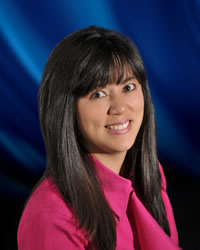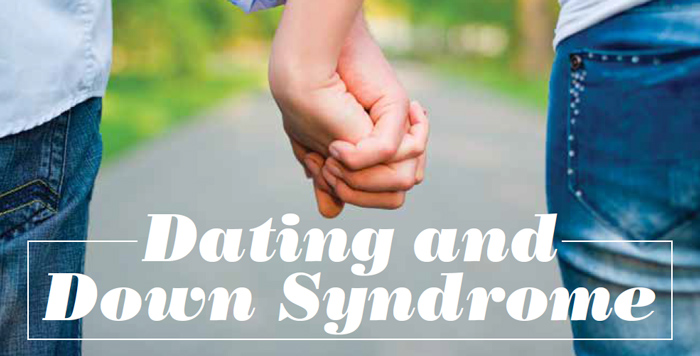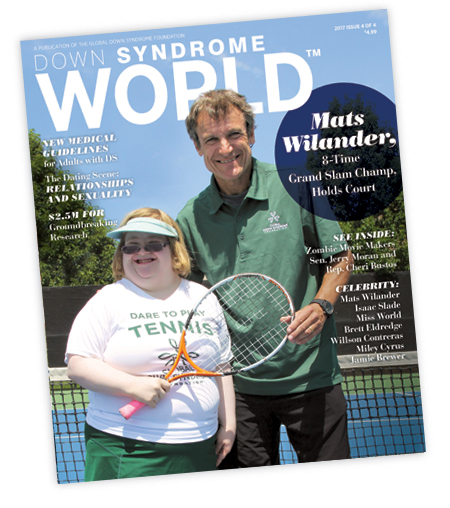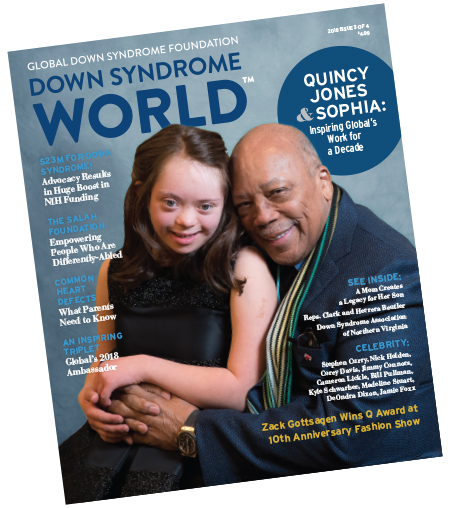2019 Be Beautiful Be Yourself Fashion Show Kick-Off Party
July 30th, 2019 by Global Down Syndrome Foundation
Model Madeline Stuart
July 29th, 2019 by Global Down Syndrome Foundation
Jamie Foxx Praises Shalva Band
July 25th, 2019 by Global Down Syndrome Foundation
Global Webinar Series – Summer 2019 Recap
July 23rd, 2019 by Global Down Syndrome Foundation
SUMMER 2019
Self-Advocates Win Landmark Federal Funding for Research: Join Global – Join the Movement
What You Need to Know
Overview & Speakers:
This webinar reviews how the Global Down Syndrome Foundation (Global) has worked with Self-Advocates, Congressional Champions, Scientists and the National Institutes of Health (NIH) to increase Down syndrome research funding at the NIH for the first time in nearly twenty years. Key takeaways from this presentation include:
• The importance of research and medical care in elongating life and improving the quality of life
• The history of Down syndrome being one of the least funded genetic conditions at the NIH
• Global’s AMAZING progress – science and NIH funding
• The Challenges still ahead
• What Self-Advocates and families can do to support life-changing and life-saving research and medical care for people with Down syndrome
 Michelle Sie Whitten, MA |
Michelle Sie Whitten, MA is the Co-Founder, President and CEO of the Global Down Syndrome Foundation (Global). Global is dedicated to significantly improving the lives of people with Down syndrome through Research, Medical Care, Education, and Advocacy. Prior to her career in the non-profit sector, Michelle was a cable TV pioneer in East Asia working for Liberty Media Corporation and Starz Encore. Her academic career was focused on international security and diplomacy and she holds a Masters degree and business certificate from Harvard University. She graduated Magna Cum Laude with a Bachelors degree from Tufts University and studied Mandarin Chinese and Women Studies at Peking University. Michelle is married to Tom, a British curator of Chinese contemporary art and they have two adorable kids, one of whom has Down syndrome. |
 Kevin Brennan |
Kevin Brennan partners with clients to craft and execute strategies involving public policy and government advocacy, with a particular focus on the health and biosciences, renewable energy, insurance and financial services, and food and agribusiness industries. Kevin draws from his experience as legislative staff for three Members of Congress and in senior government affairs positions at Amgen and the Arthritis Foundation to help clients advance their federal advocacy objectives. |
Key Takeaways:
Powerpoint Presentation: Click to Download
Important Notice
The Global Down Syndrome Foundation’s employees and/or volunteers are NOT acting as your medical professional or attorney. Responses you receive via electronic mail, phone, or in any other manner DO NOT create or constitute a doctor-patient or attorney-client relationship between you and the Global Down Syndrome Foundation (Global), or any employee of, or other person associated with, Global.
Information received from Global’s employees or volunteers, or from this website, should NOT be considered a substitute for the advice of a medical professional or lawyer. Globaldownsyndrome.org DOES NOT provide any medical or legal advice. You should consult with your own doctor or lawyer for medical or legal advice. This website is a general service that provides information over the internet. The information contained on this website is general information and should not be construed as medical advice to be applied to any specific factual situations.
GLOBAL Webinars Archive
2023
2023
2022
2021
2019
CPAP, Hearing Aids, & Glasses, Oh My! How to Help my Child & Adult Wear their Medical Equipment
What Families Need to Know: Utilizing the Pediatric Medical Care Guidelines for Down Syndrome
Self-Advocates Win Landmark Federal Funding for Research: Join GLOBAL – Join the Movement
Take A Deep Breath: Lung Infection & Cognition in Down Syndrome
2018
Dating and Down Syndrome
July 18th, 2019 by Global Down Syndrome Foundation

Recognizing your child is ready to enter the dating scene isn’t always easy. Noted sexuality educator Terri Couwenhoven helps both children with Down syndrome and their parents navigate these difficult waters.
 This article was published in the award-winning Down Syndrome World™ magazine. Become a member to read all the articles and get future issues delivered to your door!
This article was published in the award-winning Down Syndrome World™ magazine. Become a member to read all the articles and get future issues delivered to your door! RELATIONSHIPS GIVE EVERYONE a chance to love and be loved, avoid loneliness and depression, and gain self-esteem — and people with Down syndrome have the same right to these relationships as typical teens and adults.
However, “it’s common for people with Down syndrome to experience oppression, denial, and control over the same sexual aspects of being human that typical adults enjoy in their lives,” said Terri Couwenhoven, M.S., AASECT, Certified Sexuality Educator. “This can lead to a denial of feelings and a reluctance to express themselves.”
That denial can perpetuate the myth that people with Down syndrome are asexual, she said. Parents can, and should, take the lead in helping their children develop the foundations of healthy relationships, and Couwenhoven shared three key tips for parents to approach the subject of dating and relationships.
ATTITUDE MATTERS
Parents need to have a positive attitude toward their teenager’s or adult child’s dating.
“Let’s face it, parents are influential in the dating scene for teens and adults with Down syndrome,” Couwenhoven said. “In addition to making sure their children have active social lives so they have access to potential partners, parents often need to coordinate, help plan, transport, chaperone, and coach — at least initially.”
Parents also serve as role models. Engage in honest and open communication with your own partner, and be attentive to your child’s needs.
OFFER CONCRETE INFORMATION ABOUT THE DATING PROCESS
Look for opportunities to explain dating before your son or daughter is old enough to actually date, Couwenhoven advised. For example, if an older sibling has a partner, explain why people date. Use specific language, such as “they spend time dating to see if they are a good match for each other.” If the couple breaks up, you can explain, “not all relationships work out. It takes time to find the right person.”
When your child gets older and develops a crush on someone who doesn’t return the affection, remind him or her that a romantic relationship can’t start unless both people have feelings for or are interested in each other, she added.
LET THEM PRACTICE DATING SKILLS
“Life experience is the greatest teacher of all,” Couwenhoven said. “Chaperoning is an excellent way for inexperienced newbies to practice the rituals of dating in the context of super vision and coaching.”
As your teenagers and young adults with Down syndrome become more mature and gain self-confidence, chaperoning becomes less necessary.
Like this article? Join Global Down Syndrome Foundation’s Membership program today to receive 4 issues of the quarterly award-winning publication, plus access to 4 seasonal educational Webinar Series, and eligibility to apply for Global’s Employment and Educational Grants.
Register today at downsyndromeworld.org!
July 2019 Newsletter
July 17th, 2019 by Global Down Syndrome Foundation
Our New Celebrities and Awards
Congenital Heart Defects and Down Syndrome:
What Parents Should Know
July 3rd, 2019 by Global Down Syndrome Foundation

From Down Syndrome WorldTM Issue 3 2018
This rare disease is significantly more common in children with Down syndrome. Understanding symptoms and early detection could save a life.
CHILDREN WITH DOWN SYNDROME face a high rate of congenital heart defects (CHDs). In fact, about 50 percent of infants with Down syndrome have some form of heart condition, compared with approximately 1 percent of typical infants, although it is unclear why these conditions occur so frequently in children with Down syndrome.
Three of the most common heart conditions seen in children with Down syndrome are atrioventricular septal defect, patent ductus arteriosus, and tetralogy of Fallot.
ATRIOVENTRICULAR SEPTAL DEFECT (AVSD)
AVSD is the most frequently diagnosed congenital heart condition in children with Down syndrome. Various studies place the incidence rate between 30 and 47 percent of CHDs in children with Down syndrome, according to the book Advances in Research on Down Syndrome. A study from the International Journal of Cardiology estimates that AVSD accounts for just 7 percent of CHDs diagnosed in all children. AVSD is characterized by holes between either the upper or lower chambers of the heart, the atria and the ventricles, respectively.
In less severe cases, atrial septal defects (ASD) or ventricular septal defects (VSD) can occur separately. Both are caused by a “hole” in the wall the separates chambers of the heart. ASD affects the top two chambers, while VSD affects the two lower chambers.
AVSD can be diagnosed during pregnancy via ultrasound but may not be evident until a child is a few months to even a few years old. The condition almost always requires surgery, the type of which will vary depending on the kind and degree of AVSD. According to the Society for Thoracic Surgeons, which tracks heart surgery outcomes for all children, AVSD surgeries have a near-100 percent survival rate.
 This article was published in the award-winning Down Syndrome World™ magazine. Become a member to read all the articles and get future issues delivered to your door!
This article was published in the award-winning Down Syndrome World™ magazine. Become a member to read all the articles and get future issues delivered to your door! PATENT DUCTUS ARTERIOSUS (PDA)
PDA accounts for 5 to 10 per cent of all CHDs in full -term infants and between 20 to 60 percent of CHDs in pre-term infants. For children with Down syndrome, it accounts for between 5 and 18 percent. This heart defect occurs when a channel called the ductus arteriosus that connects a fetus’ heart and lungs in utero does not close after birth. While it is frequently diagnosed after birth, not all children exhibit symptoms. When symptoms do exist, they include tiredness, sweating, quick or heavy breathing, disinterest in eating, and not gaining weight as expected in a growing child.
Doctors generally employ four treatments for PDA: watchful waiting to see if the ductus arteriosus closes on its own, nonsteroidal anti-inflammatory medications, surgery, or an outpatient procedure called a transcatheter device closure. Most children undergo catheterization, according to the American Heart Association (AHA), but treatments chosen often depend on a child’s age, degree of symptoms, and whether the particular PDA responds to medications. Children with PDAs have a higher rate of mortality than children whose PDAs are closed with treatment, according to the American Academy of Pediatrics.
TETRALOGY OF FALLOT
This heart defect is fairly rare in all children. The CDC estimates that it occurs in only 1 in 2,518 (0.04 percent) of all live births. However, it accounts for 2 to 6 percent of CHDs in infants with Down syndrome.
Infants with this heart defect have four different problems: a ventricular septal defect, a narrow or obstructed pulmonary valve, an enlarged aorta, and a thicker-than-normal right ventricle. The combination reduces blood oxygen levels in the rest of the body.
Tetralogy of Fallot, which is usually diagnosed after birth, requires an open-heart surgery called complete intracardiac repair. As children grow up, they may need additional surgery to widen or replace a pulmonary valve, which can leak and lead to a condition called pulmonary backflow.
Research suggests that 90 percent of all infants who have surgery for tetralogy of Fallot live into their 40s, according to the Cleveland Clinic Journal of Medicine, but these children often face heart problems, such as arrhythmia and coronary heart disease, later in life and require lifelong follow-up care with a cardiologist.
DETECTING PROBLEMS
Certain CHDs can be diagnosed during pregnancy by a pediatric cardiologist through noninvasive testing, such as ultrasound or fetal echocardiogram. Early diagnosis of cardiac issues is crucial to ensure prompt medical response after delivery and to improve an infant’s chances to survive and thrive. In addition, a pediatric cardiologist provides ongoing care throughout childhood.
Given the frequency of CHDs in babies with Down syndrome and the optimal one-year surgical window, the American Academy of Pediatrics recommends every baby born with Down syndrome be evaluated by a pediatric cardiologist within one month of birth. This
recommendation includes children whose prenatal tests and general pediatrician found no trace of CHDs.
Whether a child with a CHD is diagnosed before or after birth, parents should, if possible, interview more than one pediatric cardiologist and cardiovascular surgeon, if necessary.
It’s also wise to ask an insurance provider about coverage for seeking a second opinion before parents decide on a care plan for their infant.
LONG-TERM PROGNOSIS
Until the early 1970s, providers were reluctant to perform heart surgery on children with Down syndrome who had CHDs, essentially predestining them to a lifetime of hear t problems. Research has since established that babies with Down syndrome fare very well after pediatric heart surgery, and delaying surgery beyond the first year of life increases the risk of problems in adulthood.
“It is much easier to find treatment for children with Down syndrome and heart defects than adults with the same condition,” says Dunbar Ivy, M.D., Professor of Pediatrics–Cardiology at the University of Colorado School of Medicine and Selby’s Chair in Pediatric Cardiology at Children’s Hospital Colorado.
Today, fewer providers avoid or delay surgeries to correct CHDs. Thanks to improvements in technology and greater knowledge of the conditions, doctors are better able to treat CHDs early, limiting their impact on a child’s life.
“If surgery is performed early, most children with Down syndrome and a hear t defect will do very well,” Dr. Ivy says.
As a child with Down syndrome and a CHD grows, he or she will need ongoing care from a cardiologist familiar with CHDs, Dr. Ivy added, whether or not the defect was repaired. Not all adult cardiologists are familiar with the unique needs of patients with congenital heart disease, but the Adult Congenital Heart Association provides an online directory at achaheart.org/your-heart/clinic directory that can serve as a starting point for research.
Like this article? Join Global Down Syndrome Foundation’s Membership program today to receive 4 issues of the quarterly award-winning publication, plus access to 4 seasonal educational Webinar Series, and eligibility to apply for Global’s Employment and Educational Grants.
Register today at downsyndromeworld.org!


 Experience our inspirational and groundbreaking videos and photos. Our children and self-advocates are beautiful AND brilliant!
Experience our inspirational and groundbreaking videos and photos. Our children and self-advocates are beautiful AND brilliant! Make sure your local Representatives are on the Congressional Down Syndrome Task Force.
Make sure your local Representatives are on the Congressional Down Syndrome Task Force.